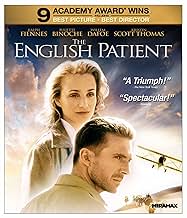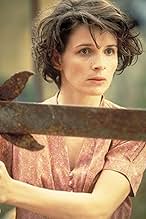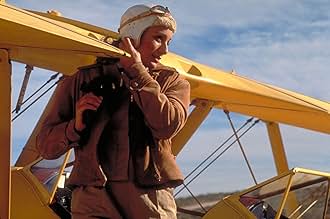No final da Segunda Guerra Mundial, uma jovem enfermeira atende a uma vítima de acidente de avião gravemente queimado. Seu passado é mostrado em flashbacks, revelando um amor fatídico.No final da Segunda Guerra Mundial, uma jovem enfermeira atende a uma vítima de acidente de avião gravemente queimado. Seu passado é mostrado em flashbacks, revelando um amor fatídico.No final da Segunda Guerra Mundial, uma jovem enfermeira atende a uma vítima de acidente de avião gravemente queimado. Seu passado é mostrado em flashbacks, revelando um amor fatídico.
- Ganhou 9 Oscars
- 62 vitórias e 78 indicações no total
- Direção
- Roteiristas
- Elenco e equipe completos
- Produção, bilheteria e muito mais no IMDbPro
Best Picture Winners by Year
Best Picture Winners by Year
Enredo
Você sabia?
- CuriosidadesThe Germans who shoot at Almásy's plane at the beginning were actually tourists roped into the production because they couldn't afford any more extras.
- Erros de gravaçãoKatharine Clifton (Scott-Thomas) explains to Count László Almásy (Fiennes), that her husband is map making in Ethiopia. The year at this point is 1939, and the country was known as Abyssinia until 1945.
- Citações
Katharine Clifton: My darling. I'm waiting for you. How long is the day in the dark? Or a week? The fire is gone, and I'm horribly cold. I really should drag myself outside but then there'd be the sun. I'm afraid I waste the light on the paintings, not writing these words. We die. We die rich with lovers and tribes, tastes we have swallowed, bodies we've entered and swum up like rivers. Fears we've hidden in - like this wretched cave. I want all this marked on my body. We are the real countries. Not boundaries drawn on maps with the names of powerful men. I know you'll come carry me out to the Palace of Winds. That's what I've wanted: to walk in such a place with you. With friends, on an earth without maps. The lamp has gone out and I'm writing in the darkness.
- Cenas durante ou pós-créditosDisclaimer in end credits: "While a number of the characters who appear in this film are based on historical figures, and while many of the areas described - such as the Cave of Swimmers and its surrounding desert - exist and were explored in the 1930s, it is important to stress that this story is a fiction and that the portraits of the characters who appear in it are fictional, as are some of the events and journeys."
- Trilhas sonorasYes! We Have No Bananas
Words and Music by Frank Silver and Irving Cohn (as Irving Conn)
Published by Skidmore Music Co., Inc.
During the war, a man (Ralph Fiennes) is discovered in the burning remnants of a crashed plane. With his face scarred beyond recognition, and with the man seemingly suffering from amnesia, he is assumed to be an Allied soldier, and is simply referred to as "the English patient." After the war, in the mine-ridden hills of Italy, a kind nurse, Hana (Juliette Binoche), who has apparently lost everybody close to her, remains in a ruined monastery to look after the dying man. Over time, she comes to learn more and more about her "English patient," who is actually revealed to be a Hungarian geographer, Count Laszlo de Almásy. Rather than losing his memory in the plane crash, we learn that this scar-ridden man has perhaps chosen to forget his past, both to protect himself from persecution and to cure himself of the tragic memories of his past love. Via numerous flashbacks, we learn of Almásy's former exploits in the Sahara desert, and his romantic liaison with a married woman, Katharine Clifton (Kristin Scott Thomas).
It's certainly easy to see why 'The English Patient' was so successful at the Oscars. It is such a beautiful film, blending the quiet beauty of the Italian countryside with the endless golden sands of the desert. Cinematographer John Seale captures the landscape to perfection; not since David Lean's magnificent 'Lawrence of Arabia' has a film shown the desert with such beauty and grandeur, making particularly good use of sweeping aerial shots from Almásy's plane. Even in the film's more intimate moments, excellent use of close-ups and lighting capture the emotion of the scene, coupled, of course, with the brilliant performances from all the cast members.
A long-time favourite actor of mine, 'The English Patient' might just contain Ralph Fiennes' finest performance, and, considering his history includes such films as 'Schindler's List' and 'The Constant Gardener,' this is not a complement that is to be taken lightly. His Count Laszlo de Almásy is initially a very sympathetic character, but, as we slowly learn more about his past, his likable qualities are eroded by his less-admirable tendencies towards others. "Ownership" is a major theme of the film. When asked by Katherine what he hates most, Almásy replies with "Ownership. Being owned. When you leave you should forget me." However, as the relationship progresses, and Katherine perhaps tries to distance herself from him, Almásy reveals a hint of arrogance, insisting that his love for her somehow entitles him to have her whenever he likes: "I want to touch you. I want the things which are mine, which belong to me."
Juliette Binoche, who received an Oscar for her performance here, is excellent as Hana, the lonesome nurse who fears to love because of the tragedies that have always harmed those close to her. After some time of caring for Almásy alone, she is joined by a dubious Canadian thief, David Caravaggio (Willem Dafoe), who lost his thumbs during the war, and who suspects that it was Almásy who betrayed him to the Germans. Hana also strikes up a tentative romantic relationship with Kip (Naveen Andrews), an Indian bomb-diffuser in the British Army. However, due to her past history, Hana is afraid that becoming involved with Kip will doom him to death, particularly considering his very dangerous line of work.
At 160 minutes in length, 'The English Patient' wonderfully evokes memories of the classic romantic epics of old, successfully finding a balance of mystery, love, joy and tragedy. The ending of the film is heartbreaking and sorrowful, but also uplifting in its own way. Whilst some romantic relationships are doomed from the very beginning, others have a very good chance of bringing happiness. Nevertheless, in every case, it is always better to have loved and lost, than never to have loved at all.
- ackstasis
- 1 de jul. de 2007
- Link permanente
Principais escolhas
Detalhes
- Data de lançamento
- Países de origem
- Centrais de atendimento oficiais
- Idiomas
- Também conhecido como
- El paciente inglés
- Locações de filme
- Empresas de produção
- Consulte mais créditos da empresa na IMDbPro
Bilheteria
- Orçamento
- US$ 27.000.000 (estimativa)
- Faturamento bruto nos EUA e Canadá
- US$ 78.676.425
- Fim de semana de estreia nos EUA e Canadá
- US$ 278.439
- 17 de nov. de 1996
- Faturamento bruto mundial
- US$ 231.976.425
- Tempo de duração2 horas 42 minutos
- Cor
- Mixagem de som
- Proporção
- 1.85 : 1








































